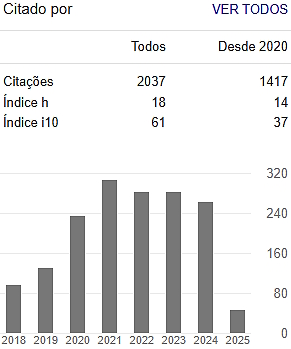INGESTIVE BEHAVIOR OF BUFFALOES FED INCREASING LEVELS OF CONCENTRATE IN SUGARCANE BASED DIETS
DOI:
https://doi.org/10.5747/ca.v15i5.2330Palavras-chave:
Bubalus bubalis, feeding efficiency, meals, rumination, Saccharum officinarumResumo
The experiment was conducted to evaluate the ingestive behavior of buffalo fed sugarcane with different levels of concentrate. Twenty four Murrah buffaloes with body weight of 219±23 kg and nine months old were assigned to completely randomized design. Animals were placed in individual pens where they received diets ad libitum, twice a day. The experimental period has divided into 30 d for adaptation and 84 d for observations and samples collection. Four treatments were used: 1) 80% sugarcane (SC) + 20% concentrate (C); 2) 60% SC + 40% C; 3) 40% SC + 60% C; 4) 20% SC + 80% C. The diets were isoproteics and urea/ammonium sulfate was used at 9:1 ratio to correct the protein level of sugarcane. The evaluated variables were time spent feeding (TSF), ruminating (TSR), idle (TSI), dry matter intake (DMI), feeding efficiency of dry matter (FEDM), rumination efficiency of dry matter (REDM), number of meals, duration of meal and duration of breaks between meal. A regression analysis was performed using the MIXED procedure. DMI was positively affected (P<0.05) by concentrate levels. The treatments had no effect (P>0.05) on TSF. However, the TSR and number of meals decreased linearly (P<0.05) as the dietary levels of concentrate increased. TSI, duration of meal and duration of breaks between meals increased linearly (P<0.05). Increasing levels of concentrate up to 80% in sugarcane based diets influence directly the feeding behavior of buffaloes resulting in fewer daily meals and more time in the trough, improving the feeding and rumination efficiencies.Downloads
Os dados de download ainda não estão disponíveis.
Downloads
Publicado
2019-10-03
Edição
Seção
Artigos
Licença
Copyright (c) 2019 Colloquium Agrariae. ISSN: 1809-8215

Este trabalho está licenciado sob uma licença Creative Commons Attribution-NonCommercial-NoDerivatives 4.0 International License.
Como Citar
INGESTIVE BEHAVIOR OF BUFFALOES FED INCREASING LEVELS OF CONCENTRATE IN SUGARCANE BASED DIETS. Colloquium Agrariae. ISSN: 1809-8215, [S. l.], v. 15, n. 5, p. 110–119, 2019. DOI: 10.5747/ca.v15i5.2330. Disponível em: https://journal.unoeste.br/index.php/ca/article/view/2330. Acesso em: 10 out. 2025.

